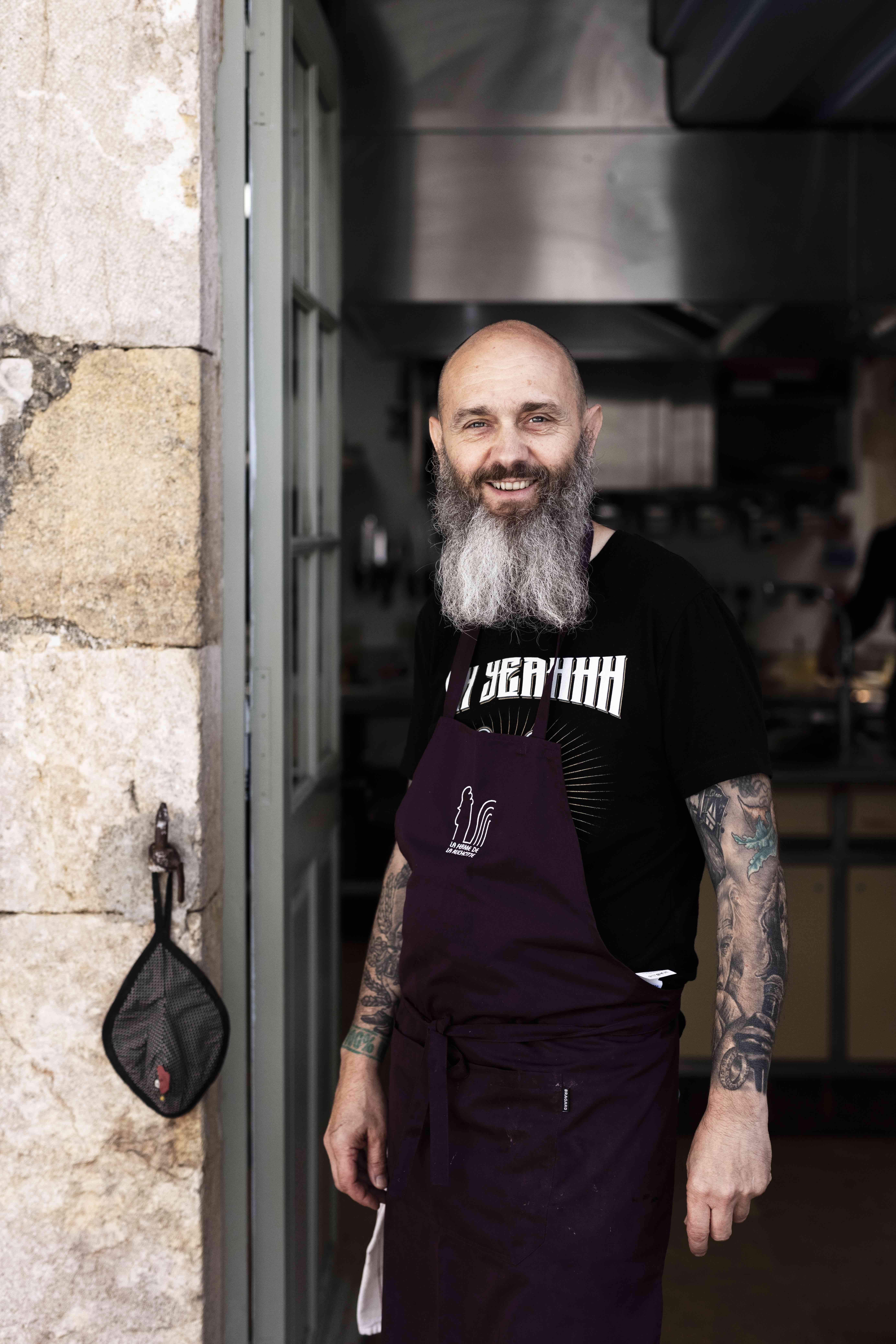For over 20 years now, this Burgundian has been growing, picking, harvesting and cooking at his farm inn in Bligny-sur-Ouche. With Jacky Durand, a reporter and food columnist for Libération, he has written La ferme de la Ruchotte. Here’s an interview with Jacky Durand before they come to the Athenaeum on 9 March.
In 2013, you published your first book on la Ruchotte. Why a new opus now?
I never got round to finalising the book, which was published by a major group. That was very frustrating for me. Even though it sold well, I didn’t feel at home in it. So I turned to a publishing house that was smaller in size and focused entirely on cooking and art: Les éditions de l’épure. When Sabine Bucquet-Grenet, its founder, and I decided to produce this new book, she suggested I work with Jacky Durand, a long-time friend of mine. And that’s how it came about.
This is not just a cookery book. Through a series of interviews over eight years, the first part explains your approach as a farmer-cook. How did this desire come about?
It’s a whole thing, a combination of encounters, circumstances and life changes. In the early 1990s, my visit to Alain Chapel’s restaurant, a few months after his death, had a profound effect on me. I had a revelation. I’d found my calling: the kitchen. Then the death of my father in 1999 turned my life upside down. I wanted to give more meaning to my life. At the time, I was working in a restaurant in search of my first Michelin star. But was that really what I was after? No. One thing led to another and I ended up buying this Ruchotte, without really knowing what I was going to do with it…
The first few years were difficult. « The place had to accept us, » you say. What do you mean by that?
The place is very old. Writings dating back to 1290 already mention it. The seasons are harsh here. More than 20 years ago now, the winters were very cold and the summers hot. There was no running water when we settled there. And I knew nothing about farming, let alone poultry rearing. I had to adapt to all the demands of the natural world around me. And not the other way round. You can’t just decide to plant carrots in a particular place and then be surprised when they don’t grow. It doesn’t work like that. We need to be more humble. You have to listen, observe and accept failures so that you can learn from them and move forward.
« Moving forward » also means cooking. In this area, nature sets the pace?
Absolutely. That’s the only way I see my work. In tune with the seasons. In spring, for example, I naturally feel like cooking with plants. And then, at a given moment, I create my recipes with what nature gives me.
As well as what nature has to offer, the bourgeoisie also influences your cooking. How do you reconcile the two?
Bourgeois cuisine is a label I’ve been stuck with. It’s become hard to shake off. In my opinion, the term is justified if it refers to repertoires such as those of Brillat-Savarin, to that cuisine of the 19th century which, although extremely rich, is unconditionally linked to nature.
From this point of view, vol-au-vent, one of your flagship dishes, is right up there. You’re in the thick of it at the moment. What is it about this recipe that appeals to you so much?
Indeed, our « vol-au-vent de grande cuisine bourgeoise » is being prepared for next week. We were discussing it with the teams. What interests us about this dish is the possibility of updating it according to what nature has to offer. We’re under no obligation to follow to the letter the recipe given by Brillat-Savarin in his Physiology of Taste. Especially as the portion would have to cost between €400 and €500, given the astronomical quantities of truffles and other luxury products he now uses. No, in a few days we should have the first asparagus. If that’s the case, I’ll use it. I’ll also have the last of the truffles, as well as the last of the winter root vegetables with which I can make a stock. The classics – quenelle, sweetbreads, kidneys, etc. – will remain. Otherwise, the customers would be all over me!
How do you see today’s cuisine?
It’s changed a lot. I think it’s in a much better position than it was ten years ago. More and more young chefs are realising the importance of this link with nature and are nurturing it with the utmost sincerity. This is in contrast to those who, purely as a marketing tactic, claim to work with organic produce or grow their own gardens. That can’t work. It’s not assumed. In terms of energy, we’re not there yet. Yes, cooking is about using products and techniques, but also, and above all, it’s about using your heart, your feelings, carried away by the emotional memories of this or that dish prepared by your mother, your grandmother…
In this case, what is your Proust’s madeleine?
Sunday meals at my grandparents’ house, over parsley, the snails they used to gather, coq au vin… These memories guide me towards a cuisine that is more emotional than bourgeois or anything else. That’s where I want to take our customers, back to their childhood, a time of deep well-being.
And what about wine?
At La Ruchotte, we favour natural wines, 90% of which are made in Burgundy with the greatest respect for the environment. I love Jean-Marc Roulot, Rougeot, Marchand-Grillot, Capitain-Gagnerot, Perrin… These estates make me dream.

